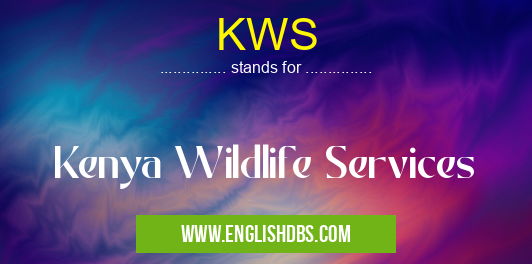What does KWS mean in UNCLASSIFIED
KWS is a commonly used acronym that refers to Kenya Wildlife Services. KWS is a state corporation established in 1990 to manage and conserve wildlife in Kenya. The organization is responsible for protecting and preserving Kenya's diverse wildlife, including its rich ecosystems, habitats, and species.

KWS meaning in Unclassified in Miscellaneous
KWS mostly used in an acronym Unclassified in Category Miscellaneous that means Kenya Wildlife Services
Shorthand: KWS,
Full Form: Kenya Wildlife Services
For more information of "Kenya Wildlife Services", see the section below.
Functions of KWS
- Wildlife Conservation: KWS works to conserve wildlife by implementing various conservation strategies, including habitat protection, wildlife monitoring, and anti-poaching measures.
- Tourism Management: KWS manages Kenya's national parks and reserves, facilitating tourism and promoting sustainable wildlife viewing practices.
- Research and Monitoring: KWS conducts research and monitoring programs to gather data on wildlife populations, ecosystems, and threats to wildlife.
- Education and Awareness: KWS engages in public education and awareness campaigns to promote wildlife conservation and responsible wildlife interactions.
- Law Enforcement: KWS has the legal authority to enforce wildlife laws, investigate wildlife crimes, and prosecute offenders.
Importance of KWS
KWS plays a crucial role in maintaining the health and diversity of Kenya's wildlife. By protecting wildlife and its habitats, KWS ensures the preservation of Kenya's rich biodiversity and supports the country's tourism industry.
Essential Questions and Answers on Kenya Wildlife Services in "MISCELLANEOUS»UNFILED"
What is the role of Kenya Wildlife Services (KWS)?
KWS is the principal government agency responsible for the conservation and management of wildlife and their habitats in Kenya. It focuses on protecting threatened and endangered species, promoting sustainable wildlife utilization, and managing protected areas.
What are the key responsibilities of KWS?
KWS's responsibilities include protecting wildlife and their habitats, conducting research and monitoring, preventing wildlife crime, managing protected areas, providing tourism services, and educating the public on wildlife conservation.
How can I support the work of KWS?
There are various ways to support KWS, including visiting national parks and reserves, donating to conservation efforts, reporting wildlife crimes, and volunteering for conservation projects.
What are the major challenges facing KWS?
KWS faces challenges such as wildlife poaching, human-wildlife conflict, habitat loss, climate change, and illegal wildlife trade.
How does KWS work with local communities?
KWS collaborates with local communities through outreach programs, conservation education, and community-based wildlife management initiatives to promote sustainable wildlife utilization and foster coexistence.
What are the key conservation success stories achieved by KWS?
KWS has achieved significant conservation successes, including the recovery of elephant and lion populations, the establishment of new protected areas, and the implementation of anti-poaching strategies.
How can I become a member of KWS?
Membership is open to individuals and organizations who support KWS's mission and contribute to its conservation efforts. Membership benefits include exclusive access to parks and reserves, conservation updates, and promotional offers.
Final Words: KWS is an essential organization dedicated to protecting and preserving Kenya's wildlife. Through its comprehensive conservation programs, tourism management, research, and education initiatives, KWS contributes to the sustainable management of Kenya's natural heritage for present and future generations.
KWS also stands for: |
|
| All stands for KWS |
